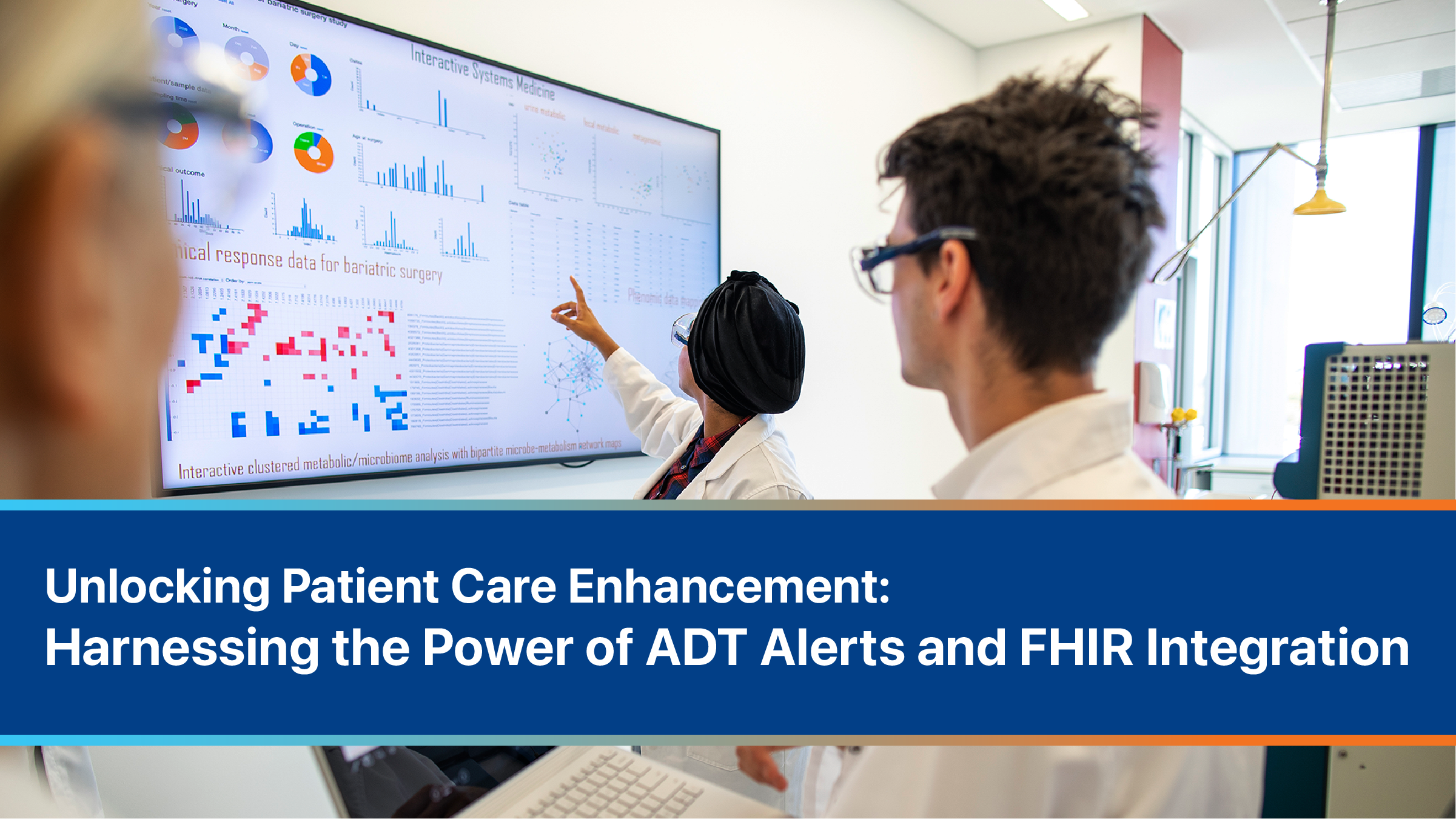Enhancing Patient Care through ADT Alerts and FHIR: A Comprehensive Compliance Perspective
25 Mar

In the realm of healthcare, the seamless exchange of patient information is pivotal for enhancing patient care and outcomes. The integration of Admission, Discharge, and Transfer (ADT) alerts within the Fast Healthcare Interoperability Resources (FHIR) framework stands as a testament to this belief, underpinned by the provisions of the CMS Interoperability and Patient Access Rule, the 21st Century Cures Act and the Trusted Exchange Framework and Common Agreement (TEFCA). These regulatory frameworks collectively push for a healthcare ecosystem where data exchange barriers are minimized, and patient data accessibility is maximized.
CMS Rules, Cures Act and TEFCA: A Unified Front for Interoperability
The CMS Interoperability and Patient Access Rule, operational since May 1, 2021, mandates hospitals to send electronic notifications of a patient’s ADT events to other healthcare facilities or practitioners1 . This directive aligns with the broader objectives of the 21st Century Cures Act, emphasizing the prevention of information blocking and promoting the access, exchange, and use of electronic health information (EHI).
Non-compliance with these regulations not only impedes the progress toward interoperability but also subjects entities to significant penalties. Healthcare providers that fail to adhere to the information blocking provisions of the Cures Act may face investigation and corrective action plans, whereas CMS has outlined that hospitals not complying with the ADT notification requirements could risk losing their Medicare and Medicaid certifications.
TEFCA further supports these objectives by establishing a standardized framework for health information exchange across the United States, leveraging Qualified Health Information Networks (QHINs) to ensure efficient EHI exchange, including ADT alerts. This framework complements the CMS Rule and Cures Act by providing an additional layer of interoperability, facilitating seamless health data exchange on a national scale.
Why FHIR Over HL7 v2, CCD, or X12?
The choice of FHIR as the standard for ADT alerts and other health data exchanges is not arbitrary. Unlike its predecessors, HL7 v2, Continuity of Care Document (CCD), and X12, FHIR is designed for the internet age, offering a modern, web-based approach to healthcare information exchange. FHIR leverages RESTful APIs, making it easier for developers to create apps that can access and use health data in real-time. This aligns with the CMS and ONC’s push towards creating an ecosystem where patients can access their health data through third-party applications, enhancing patient engagement and care outcomes2.
FHIR’s capability to support granular data access and its adaptability across various platforms renders it superior to HL7 v2, which, while widely used, lacks the flexibility and interoperability FHIR offers. Similarly, while CCD provides a document-based view of patient data, it does not support the real-time, API-driven data exchange that FHIR enables. X12, primarily used for administrative and financial transactions, does not cater to the clinical data exchange necessary for effective ADT alerting and patient care coordination.
Embracing the FHIR Standard for ADT Alerts
The integration of ADT alerts within the FHIR framework, as mandated by the CMS Rule, supported by the Cures Act and TEFCA, is a critical step forward in achieving healthcare interoperability. By enabling real-time notification of patient transitions across care settings, healthcare providers can ensure that every stakeholder in a patient’s care journey is informed and engaged, thereby enhancing care coordination and patient outcomes.
Healthcare providers must embrace FHIR for ADT alerts and other data exchanges, not just to comply with regulatory requirements but to actively contribute to a healthcare ecosystem that is more connected, efficient, and patient-centered. The transition towards FHIR and adherence to the regulatory provisions is not merely a compliance exercise but a commitment to improving healthcare delivery and patient care.
Connect with FHIR Experts at Aigilx
At Aigilx, we specialize in providing cutting-edge FHIR solutions and services designed to streamline healthcare data exchange, enhance patient care, and support your organization’s transition to value-based care models.
Our team of FHIR experts is dedicated to delivering tailored solutions that meet the unique needs of your healthcare organization. Whether you’re looking to implement ADT alerts, improve care coordination, or ensure seamless data interoperability across various health information systems, Aigilx has the expertise and technology to help you achieve your goals.
Don’t let interoperability challenges hold you back. Contact Aigilx today to learn how our FHIR solutions can transform your healthcare delivery and patient outcomes.
To find out how to handle multifaceted ADT data in the patient’s care journey, get in touch with Aigilx.
Categories
- 1115 Waiver (8)
- ACO (7)
- AI (2)
- Aigilx Health (2)
- CCBHC (8)
- Control Center (10)
- FHIR Facade (7)
- FHIR Server (14)
- HIE (5)
- Payers (8)
- Providers (11)
- Rapid Fire (9)

Aigilx health specializes in developing Interoperability solutions to create a healthcare ecosystem and aids in the delivery of efficient, patient-centric and population-focused healthcare.
